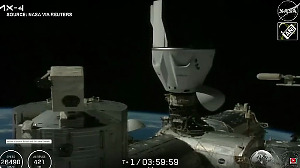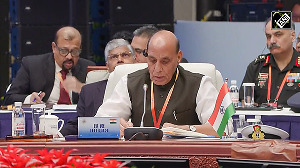Indian Space Research Organisation's INSAT system appears to be a commercial failure if one goes by the global survey of satellite operators who provide telephone and television services.
ISRO, that has been launching INSAT communication satellites for over two decades, does not figure either in the main list of top 20 satellite operators or in the supplementary list of five operators that are on threshold of commercial success.
The ranking is done annually by the Washington-based international weekly Space News on the basis of gross annual revenue earned by the satellite operators around the world.
According to the survey, countries like Thailand, Spain, South Korea, Brazil, Saudi Arabia and even Mexico -- which launched their space programmes much later than India -- find a place in the top 20 list.
Malaysia with two satellites, Philippines and Argentina with just one satellite each have made it to the supplementary list of five 'on the cusp', but ISRO with a fleet of five satellites does not figure in either list.
While the Brazilian operator earned $90.1 million 2002, Arabsat of Saudi Arabia earned $147 million and Mexico, with just three geostationary satellites, grossed $85 million and was ranked 17 in the top 20 chart.
SES Global of Luxembourg with earnings of $1.41 billion emerged as the world's largest commercial provider followed by Intelsat ($992 million) and PanAmsat Corporation ($812.3) both based in the United States.
Twelve years ago, ISRO created a separate company called Antrix to market the space products. Antrix officials declined to comment on the global survey but admitted that no study on the cost effectiveness of the Indian communication satellites has ever been done.
Antrix officials said they are yet to find a buyer for ISRO's satellites or get a commercial launch contract. The three foreign micro-satellites so far launched by ISRO's rockets were scientific payloads carried as piggyback for a token fee and not commercial cargo in the usual sense.
A recent study by Ernst & Young, a well-known consultancy organisation, said chances of ISRO getting launch contracts will not improve until its rockets can lift satellites weighing four tonnes.
Right now the capability is 1.8 tonnes.





